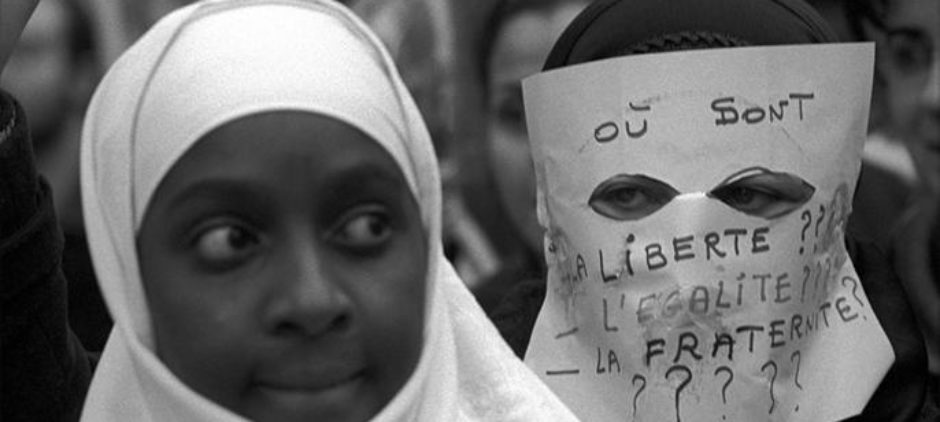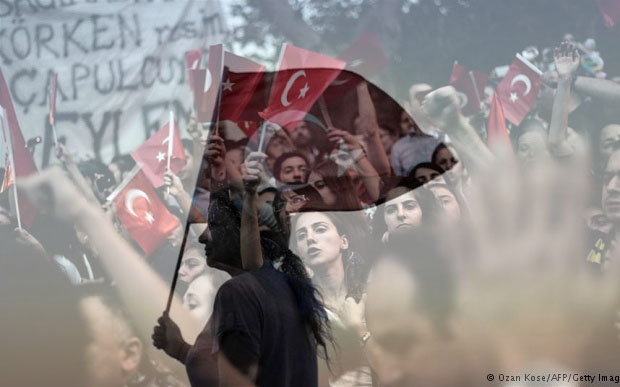The question of whether or not religion and democracy can coexist on a secular plane without infringing on the natural rights of the public has been a main source of contention for the modern world. The AK Party (Adalet ve Kalkinma Partisi-Justice and Development Party) of Turkey that came to power in 2002 seemed to offer a hopeful answer to this question. The party provided a religious alternative for the people of Turkey who felt the strict secularists ideals were no longer working. Yet, the AKP’s Islamic roots inspired fear and anxiety in those who favored strict secularism as they worried that AKP members secretly harbored an Islamic agenda. Regardless of those fears, the AKP operated successfully for a while in Turkey, boosting economy and expanding Turkey’s global influence. It was not Islam that caused the Party’s downfall, but corruption. Using the AKP as an example, it’s possible to answer in the affirmative – that religion and democracy can coexist – but the world has yet to produce a political system that incorporates both elements, has longevity and remains free of corruption.
Since the fall of the Ottoman Empire in 1918, Turkey has existed as a secular democratic state with a strong Muslim majority. However, towards the end of the 20th century, many Turkish citizens grew increasingly dissatisfied with their country’s secularist rules. AKP Party member Recep Tayyip Erdogan’s defeat of the notoriously secularist Republican People’s Party (CHP) ushered in a new political era. In his work, “Islamic Secularism,” Dr. Charles Kurzman demonstrates the difficulty of distinguishing a clear line between religion and secularization saying, “In the majority of Muslim societies, there is not a distinct separation between religion and other aspects of people’s lives. Islam is both din wa dunya (religion and the world)” (Kurzman 615). These secular limitations became increasingly problematic and contributed to the growing support of the AKP especially when Turkey started seeing an increase of an openly religious middle class as modernization and urbanization brought more traditional minded people into the cities (Rabasa and Larrabee 7). The growing discontent created as a result of these circumstances lended to the start of a new political era when Recep Tayyip Erdogan of the AKP beat the notoriously secularists Republican People’s Party (CHP).
However, the victory of the AKP sparked never-ending controversy over its intentions. Rather than campaign on behalf of its Islamic roots the AKP presented itself as a party concerned with economic stability and European Union membership (Rabasa and Larrabee 51). It represented what citizens wanted, which according to Dr. Ayla Gol was “reform and change, economic growth and political stability and the AKP was seen as the only party to deliver such expectations” (Gol 805). The party denied an Islamic agenda and instead emphasized its ability to exist as a democracy. Rabasa and Larrabee compared the AKP to the “Christian Democrats in Western Europe – in which religion is a cultural backdrop rather than an active part of the political agenda,” and they described Erdogan as leading “a movement of ‘Muslim Democrats’” (3). This portrayal of the earlier years of the AKP is quite accurate in demonstrating the party did not launch the Islamic crusade that many secularists feared and speculated, but lessened the strict secular burden on everyday religious life to quell growing public dissatisfaction with how the secular legacy was no longer meeting the political and cultural needs of Turkish citizens.
A major factor in understanding how religion and democracy can coexist in Turkey is through recognizing the power of the modernized West and the AKP fully comprehended the power play that was at hand. Although its original association as a democracy was to provide a voice for the people it also stemmed from a political tactic to keep not only the West happy but to ensure cooperation from fear mongering secularists. Rabasa and Larrabee describe the AKP’s use of democracy in relation to the global market as strategic move to ensure Turkey’s presence as a formidable player on the world stage.
“It realized the advantages of speaking the language of democracy-which enables the party to communicate with the West and to reassure those who suspect that it may secretly harbor an Islamist agenda. Erdogan has spoken about ‘marketing Turkey’ and has defended the idea of globalization. The West, in turn, has emerged as an ally of the AKP” (4).
However, the need to appease the West in order to achieve recognition on the modern, global scale became problematic over time. With the support of the people Erdogan adopted laws that were in favor “toward European Union norms” which resulted in economic success for sometime “as he pushed privatization and investors from abroad poured money into the country” (Hansen 1). Yet this began the start of the Erdogan’s power hungry and authoritative regime that would eventually lead to the party’s decline that will later be illustrated.
Regardless of controversy over whether the AKP has had Islamifying intentions from the start, one thing is for certain: the Party has failed to fulfill its promises to citizens. What once stood as symbol for hope and a source of fairer representation for the Turkish people now exists as a corrupt political party heading rapidly toward an era of authoritarianism. Although Erdogan’s political leadership hasn’t quite proven the original fears of the secularists he also hasn’t fulfilled his initial goals. While the public’s desire for economic growth was accomplished by the party during its first term, when the economy experienced an average annual GDP growth of 7.2 percent, by 2014, that economic growth had decreased to 2.9 percent (Gorvett 1). Dissatisfaction ensued sparking the 2013 Gezi Park protests that resulted in violence when police used tear gas and pepper spray on protestors and burned their tents. According to New York Times writer, Suzy Hansen, when Erdogan was later asked of his involvement in the police brutality of the protests he responded, “‘I brought the people responsible into my office and yelled at them. I made them cry'” (Hansen 1). Erdogan apathetic nature for the people of Turkey only continued to spiral as power and corruption clouded his leadership and he sought to punish those who went against him. Turkey, once a beacon of modernization, was now becoming unrecognizable as “thousands of activists have been detained, their schools or workplaces investigated, their homes raided. Informal emergency medical care, common during street protests, has been criminalized” (Hansen 1). The AKP then began imprisoning journalists for negative press and putting them on trial and as a result Turkey was landed itself as “154th out of 180 countries in the World Press Freedom Index in 2014” (Gorvett 1). In contrast to Gol’s description of the original intentions of the AKP in which “the reformists emphasized the idea of a new and clean (‘ak” literally means both white and clean in Turkish) leadership determined to eradicate corruption from the state system,” the current disposition of the AKP is much different and much more corrupt (Gol 803). What once existed as a source of Turkish empowerment now acts as a cry for change.
Yet the question still remains: can Turkey’s government be religious, secular, and democratic? The AKP once stood as a voice for Turkey’s people, but officials have silenced those who disagree with its political methodology. However, full blame should not be placed on the authoritarian direction of Erdogan as the West harnessed Turkish desire to operate on a global scale by using Turkey to bridge the cultural and political gap that is troublesome to begin with. The AKP no longer needed the approval of the people but the consent of the West and Erdogan’s power trip became the new goal as Hansen states, “The state remains a tool for accumulating disproportionate power, and when threatened, it sacrifices its citizens to save itself” (Hansen 1). Although the AKP is failing and bringing about new problems to discuss it self acted as a starting point for better representation and brought to light the tricky problems religion, democracy, and secularism can embody. In reviewing the history of the AKP one would realize that the real problems never lied within its association to Islam but the authoritarian leadership that was slowly snowballing under the constant distraction of the ongoing religion vs. democracy duel that was taking place. Religion and democracy can coexist in Turkey but no party has assumed the aptitude to see it through.
Works Cited
Anwar, Ghazala, and McKay, Liz. “Veiling.” Encyclopedia of Islam and the Muslim World. Ed. Richard C. Martin. Vol. 2. New York: Macmillan Reference USA, 2004. 721-722.
Hansen, Suzy. “Whose Turkey Is It?” The New York Times Magazine. The New York Times, New York. 2014. Web.
Gol, Ayla. “The Identity of Turkey: Muslim and Secular”. Third World Quarterly. Penglais: Aberystwyth, 2009. Web.
Gorvett, Jonathan. “Turkey Reins in Its Rulers.” Washington Report on Middle East Affairs Vol. 34. 2015. Web.
Keyman, E. Fuat and Gumuscu, Sebnem. “Democracy, Identity and Foreign Policy in Turkey.” Palgrave Macmillan, New York. 2014. Web.
Kurzman, Charles. “Islamic Secularism.” Encyclopedia of Islam and the Muslim World.Ed. Richard C. Martin. Vol 2. New York: Macmillan Reference, USA. 2004. Web.
Rabasa, Angel, Larrabee, F. Stephen. “The Rise of Political Islam in Turkey.” The Rand Corporation, Santa Monica CA. 2008. Web.
Base photo-AFP/Getty
Top image-Ozan Kose/AFP/Getty Images

